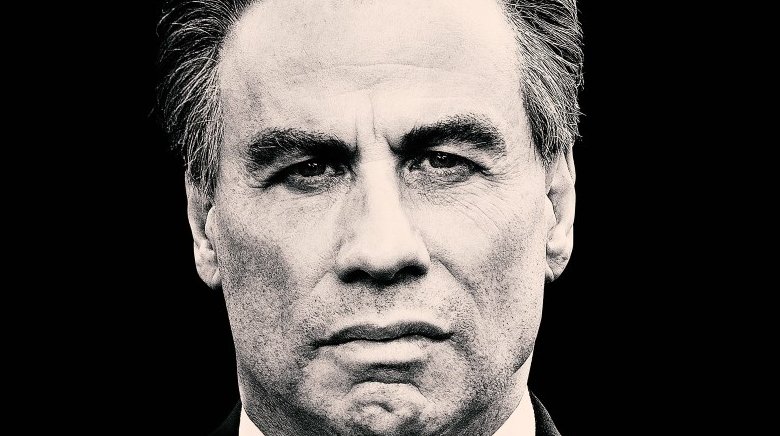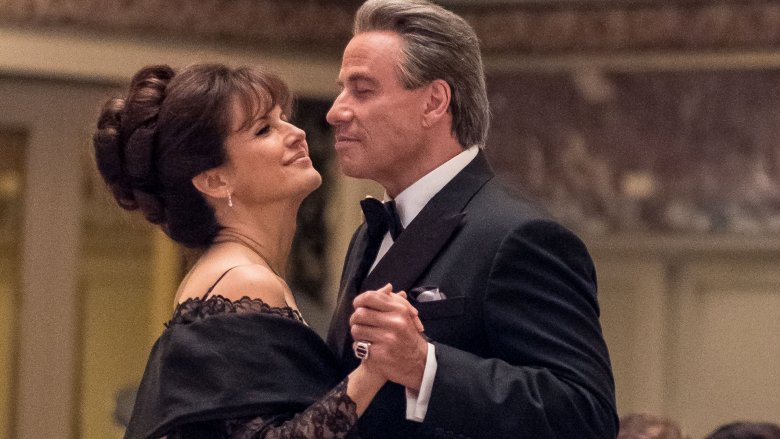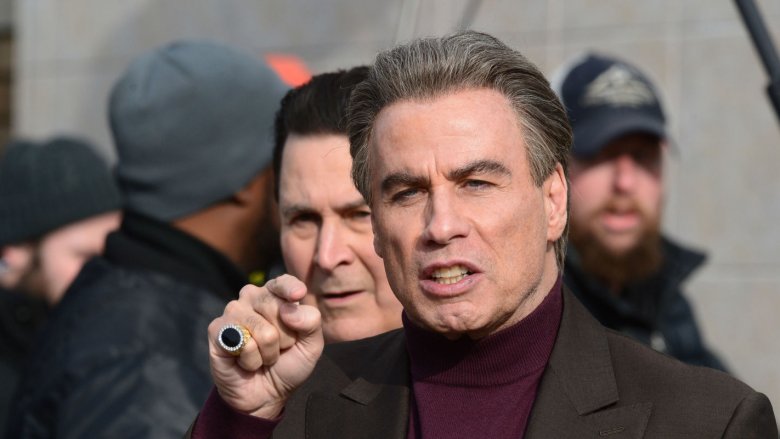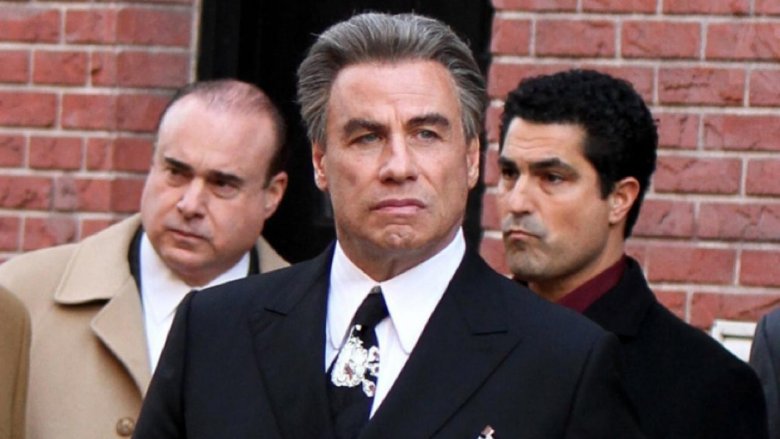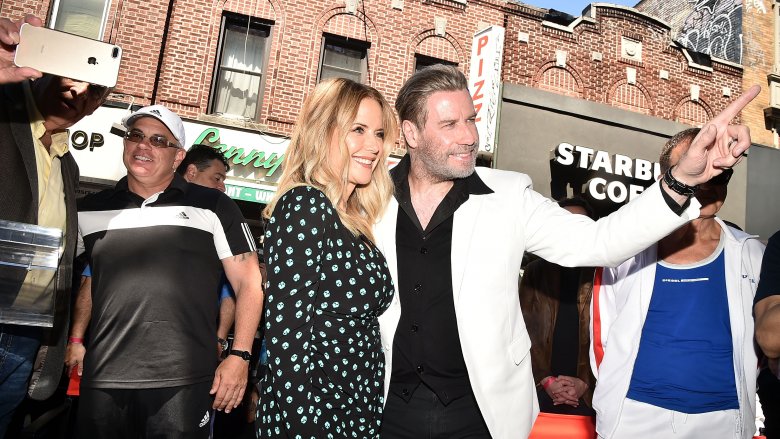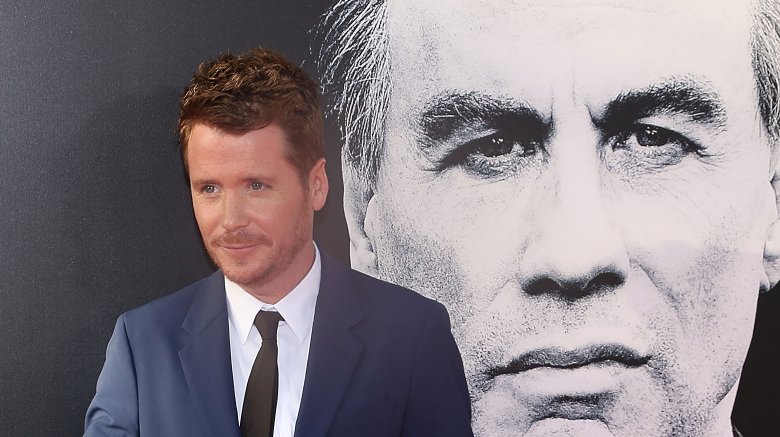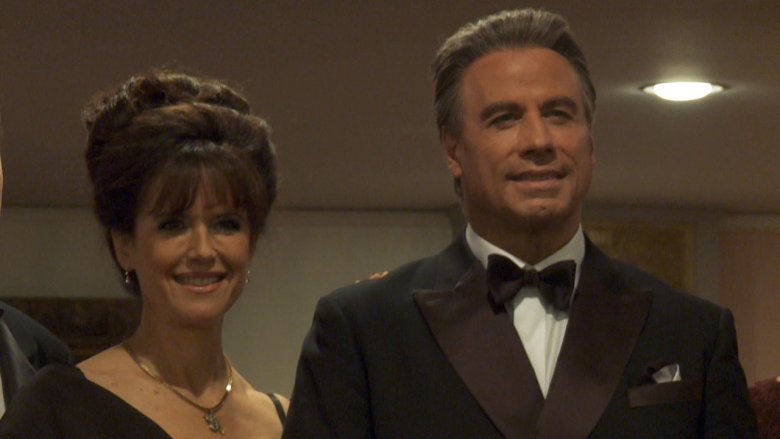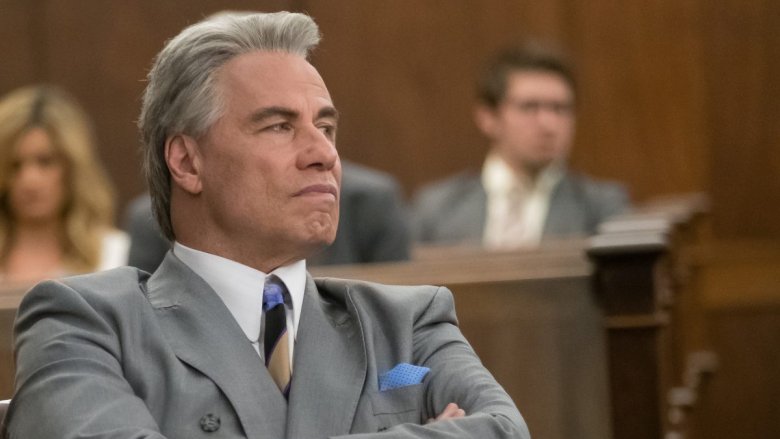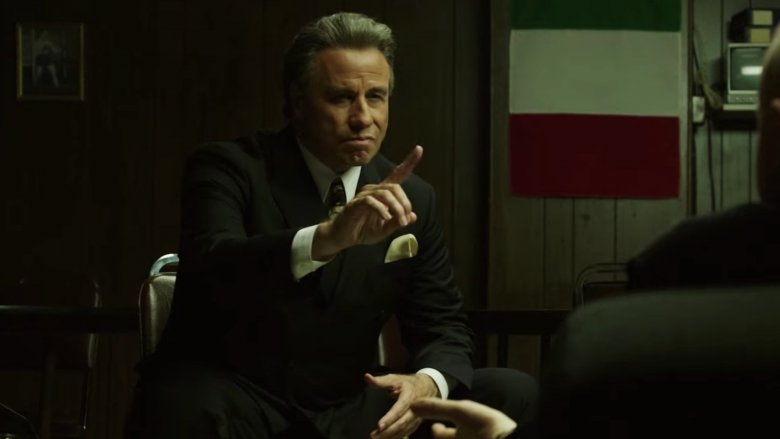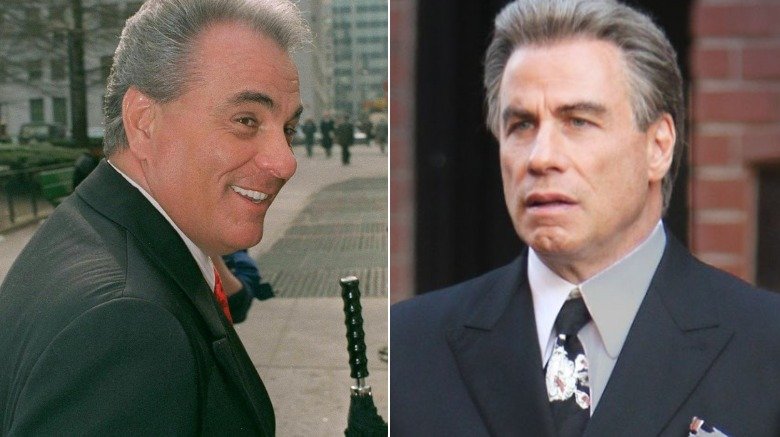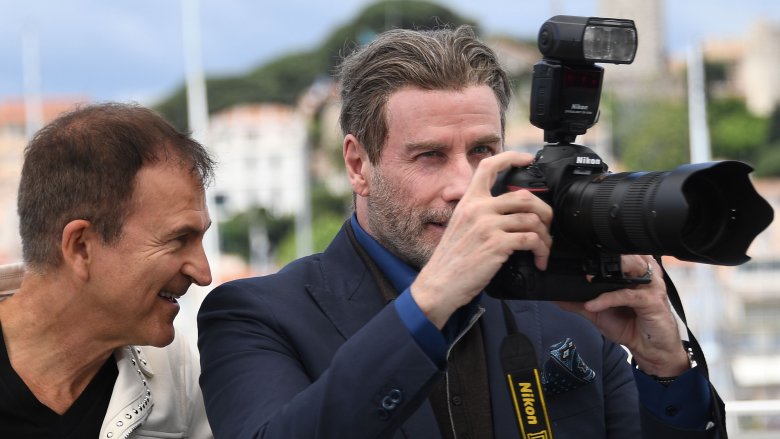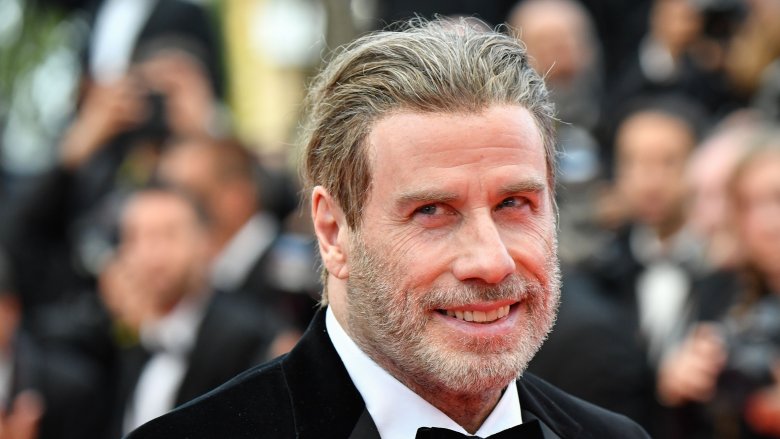The Real Reasons Gotti Has A 0% On Rotten Tomatoes
There's nothing like a high-profile cinematic disaster to really bring the people together. Gotti, the John Travolta-led movie about the New York City-based crime boss John Gotti, is the latest big-screen mess to come out and unite film critics, notching a perfect 0% rating on Rotten Tomatoes.
Is Travolta's Gotti biopic, a long-in-development effort directed by Kevin Connolly from Entourage, really the worst mob movie ever made? Maybe — but it's a little more complicated than that. A zero on the review aggregating service doesn't mean a movie is the worst ever — it just means that no one who reviews movies for a living thinks it comes anywhere near close to being good. In short, Gotti's not the worst movie ever made by a long shot — it's just indisputably bad.
Rolled out in limited release to 503 theaters, Gotti has brought in around $2 million at the box office, a respectable number for such a small release. The marketing team wants you to believe that critics have it out for the movie while audiences are perfectly pleased with it — but is that unorthodox advertising gambit even based in fact? We've caught the film and followed the controversy, so read on if you want to know the real reason Gotti got a critical goose egg.
Scene to scene
The first fault Gotti makes obvious to the viewer is the one that sticks with you the longest after you've left the theater: The movie is incomprehensible. On a scene-to-scene basis, the editing fails in every way to tell a story in any kind of effective manner.
As an illustrative example of shoddy editing, the initial six scenes of the movie take place in six discrete time periods, jumping all throughout the life (and afterlife) of John Gotti with what feels like complete randomness. He enters prison with no context, he leaves prison with no context. This continues throughout the film.
The chaotic storytelling is threaded together by randomly deployed voiceover from Travolta, as well as archival news footage to serve as de facto narration that explains the plot. While these intrusions are ever-present, they never even come close to being enough to help the movie make sense.
The only way to get anything out of the movie's story is go go directly from the theater to John Gotti's Wikipedia page. There, you will find a compelling story, arranged in order, containing adequate context and edited for clarity. And then you will regard your $10 movie ticket stub and feel decidedly hoodwinked — because Wikipedia, of course, is free.
The passion of Travolta
Generally speaking, John Travolta is not a bad actor. He's not even a terribly bad actor in this movie, though one does wonder if he was the right choice for the role. His performance is one of the few bright spots of Gotti's runtime, but not for particularly good reasons. Pacino in The Godfather this is not — it's more Pacino in S1m0ne.
The whole movie rides on the back of Travolta's charisma — which really is still there, however it may have diminished over the years. He commits to the role of John Gotti with the same degree of high camp he brought to his performance as Robert Shapiro in American Crime Story: The People vs. O.J. Simpson. It's undeniably entertaining, if at times unintentionally humorous.
Travolta is committed to channeling Gotti with his performance, broadcasting a facsimile of the Italian-American gangster to the very back seats of the auditorium. This dude ladles so much marinara over his pronunciation of the words "La Cosa Nostra" that you'll snort spaghetti out your nose. He wants to take you on a tour of Italy with this accent. He speaks like he's got Joe Pesci stuck in his throat — or, as Travolta would put it — his "troat." If this movie were a Saturday Night Live sketch, his approach would be perfect, but it's sort of hard to swallow in the context of a seemingly serious-minded biopic.
No-act structure
The problems with Gotti begin with its screenplay and branch out from there. Instead of taking a traditional, time-tested approach, chronicling the rise and fall of a protagonist from point A to point Z, the story gets a little crazy with its structure.
The movie begins in a sort of purgatory, with Travolta's Gotti looking wistfully out over New York City and thinking back on his life. But instead of taking us back to the beginning, the movie leaps around at random, intercutting Gotti's early kills as an aspiring leader with his final days as an incarcerated, cancer-stricken old man.
Flashbacks nest inside of other flashbacks, with the future and past being made to mingle together meaninglessly. The result is a movie that has no narrative thrust, just a procession of scenes, with an overall story that never reaches any sort of climax.
One of the most common story frameworks for a movie is the three-act structure, which splits a story into three discrete sections: a setup, a confrontation, and a resolution. Gotti skips the setup and starts with resolution, never introducing a compelling confrontation; the government just keeps trying to catch Gotti, until eventually they do. Afterwards, the story abruptly shifts to Gotti's son, who gets to finish off the film with his own miniature adventure. It makes for a movie that feels overlong and aimless. It's not transporting — it's a chore.
Can't stop the music
Putting popular music on a movie's soundtrack is a great way to inject some artistic style into a film, with songs inserted to compliment or ironically clash with the mood of a scene. Good song choices can elevate a movie, but bad ones can come across as uninspired and distracting. Gotti is guilty of the latter.
From the tired "House of the Rising Sun" to Elvis Presley's "Silent Night," you've heard the pop songs on this soundtrack a million times before, and the new songs recorded exclusively for the movie by pop star Pitbull are tracks you'll never want to hear again. These are the kinds of songs you'd get on a 50-cent thrift store CD, and they do nothing for the movie.
Beyond the Suicide Squad-esque "pop songs in place of emotional substance" approach, the score of the movie itself is just a cornball mess. Its mood music comes off like an unironic version of Twin Peaks' melodramatic, soap opera pseudo-parody, played completely straight.
Filmmaker E is not
Gotti is the third film to be helmed by Kevin Connolly, best known for playing the role of Eric "E" Murphy on HBO's Entourage. To put it bluntly, it isn't a good showcase for the filmmaker's talent.
The movie is characterized by very simple direction, with many scenes blandly showing actors speaking to each other in shot/reverse shot. It seems unfair to compare this movie to Scorsese again, but the subject invites such comparisons. Goodfellas, for instance, used a famous, ambitious long take to demonstrate the power and influence of protagonist Henry Hill, with Hill and his date moving effortlessly through the back passageways of a bustling restaurant. The sequence tells a story by the way it's constructed, and nothing in Gotti even comes close to that level of filmmaking flair. The movie is flat, its blocking dull, made with an ambition that never visibly rises above getting the actors in frame and pressing "record."
The end result makes Connolly appear to be in over his head in every way. The movie makes you want to go and rewatch Entourage, just so you can see him up on screen doing what he does best — which is to say literally anything else.
Technically bad
While many of Gotti's stylistic faults have to do with Connolly's subpar eye for filmmaking, the movie also has a number of mind-boggling technical problems, the sorts of embarrassing and unforced errors that film school curriculums are designed to hammer out of you.
Amateur mistakes in the finished movie include many instances of poor lighting, leaving actors' faces in shadow; other shots are out of focus and blurry. The sound mixing throughout is atrocious, constantly favoring the music and score over crucial bits of dialogue. People mumble to each other in crowded clubs, chat at noisy dinners, and bark obscenities to each other before fights, and all of it ends up getting lost in an unmannered maelstrom of noise.
Even with a modest budget of $10 million, the amateur mistakes on display here are baffling and inexcusable. You can say there's a good movie in here somewhere, sure — it would just need to be made, top to bottom, by completely different people.
Faces, places
Contributing to the sense of confusion that Gotti cultivates is its specific problem with establishing characters or scenes. The viewer will very quickly be forced to give up on keeping track of the sprawling cast of New York City criminal characters, who are introduced briefly, if at all.
Sometimes names of characters, locations and time periods are established via onscreen text or dialogue, and sometimes they're not, with the identification of the movie's faces and places being deployed seemingly at random. It ends up feeling like the movie was edited in a rush over the course of a weekend, with vital information about who we're watching and where they are slapped desperately over the footage in the hopes of helping the audience keep up. It never works. The result is a movie that is borderline impossible to follow, with a story beneath the surface that just isn't anywhere close to being worth the effort.
A lousy vintage
Another one of Gotti's failures has to do with its total inability to convincingly establish any of its scenes with era-specific detail. This is a decade-hopping period piece of a movie, spanning 30 years between the '70s and early 2000s, yet every scene looks like it takes place during the same time period — which is to say, sometime around the summer and fall of 2016.
Production designers who work on films should be able to access a whole wealth of vintage, throwback material to help a story that says it takes place in the '80s feel like it's actually in the '80s. Vintage signs and advertisements, fashion choices and period-accurate cars — all of these elements and more can make a movie set in the past feel real. When they're not there, your mind notices. Additionally, the film constantly includes actual contemporary news reports that comment on the events of the movie, and the disparity between the look of the news footage and the low-budget film they're stuck in stands out, making it difficult to ignore how artificial the movie's design is.
The spitting image?
Another major problem that stems from the use of archival news footage to further the plot and establish the setting is the fact that none of the actors look anything like the actual characters they're playing.
In many movies, this lack of resemblance between a performer and the person they're portraying is just the cost of doing business, and something you can suspend your disbelief for. Josh Brolin doesn't really look like George W. Bush, Rami Malek doesn't really look like Freddie Mercury, and pretty much no one who's played Richard Nixon has managed to look like the real man. This is not the sort of thing that sinks a movie — usually.
Gotti commits an unforced error by threading real news footage and photography of the people being portrayed throughout the movie, intercutting images of the real people alongside the actors trying to play them. All it does is serve to highlight just how different everyone looks from the people they're portraying, leading to confusion as you try and puzzle out who's supposed to be playing who. It's a move that heightens the movie's sense of unreality, taking any shot at verisimilitude and smothering it before your eyes.
A pained production
How did all this happen?
Like many films that turn out to be subpar, Gotti went through a protracted and tortured production process, starting with the first efforts to get the movie off the ground in 2010. A number of actors came and left the movie over the years, including Al Pacino, Lindsay Lohan, and Joe Pesci. Behind the camera, the project was passed from Barry Levinson to Nick Cassavettes to Joe Johnston before finally being pitched, in seeming desperation, to Connolly.
Over the years, the movie ended up acquiring an utterly stunning 44 credited producers, picking up financing here and there in a stuttering, start-stop manner. After it was shot, the movie had difficulty seeing release, with former distributor Lionsgate wanting to dump it straight to streaming with a limited release. After being bought back by the producers, Gotti received significant financial backing from MoviePass, which gave it its final, belated push toward theatrical release.
The result of the chaotic production process is that this feels like a movie without an author, punted around from party to party like a hot potato until it finally ended up smushed across screens around the country in a dry, stale mess.
The mob pushback
Where there's smoke, there's often fire, and Gotti was positively smoldering by the time it hit theaters. The 0% Rotten Tomatoes rating didn't come as a surprise, with the movie's reputation as a stinker having long preceded it. But instead of elegantly taking the loss, the producers behind Gotti launched an unorthodox, divisive marketing campaign meant to discredit critics, claiming audiences loved the movie despite the assassination attempts of the movie-reviewing press.
The problem with that line of thinking is that it appears to be untrue.
As pointed out by Screen Junkies' Dan Murrell and others, a literally unbelievable number of users on Rotten Tomatoes have left positive reviews for the movie. While the site has since verified that these reviews weren't made by robots, the exaggerated number of reviews clearly suggests a concentrated campaign to raise the audience score. (Interestingly, the exact same thing appears to have happened with American Animals — the only other release Moviepass has invested in.)
Additionally, according to Deadline, a significant number of tickets for Gotti appear to have been bought by the producers themselves. Altogether, the evidence makes a convincing case that Gotti isn't an unfairly maligned movie for the masses. In actuality, the whole thing seems to be a total racket.
